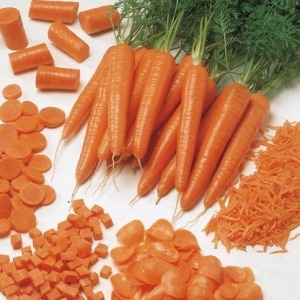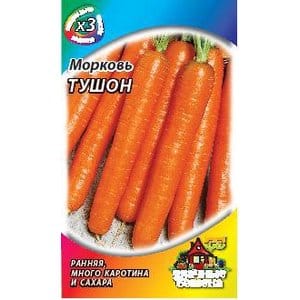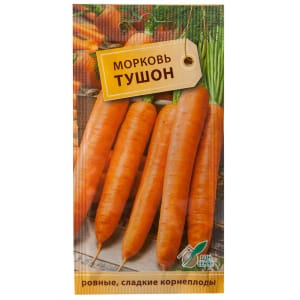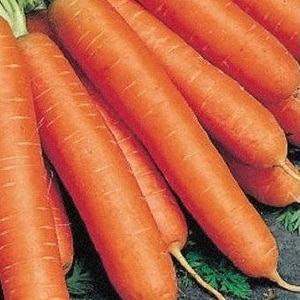Amsterdam early ripening carrot variety Tuchon
Tushon is a mid-season variety of carrots with excellent presentation, juicy and sweetish taste of root vegetables, and a high content of nutrients in them. The high yield and strong immunity of the crop have made it popular among both amateur gardeners and professional farmers.
Description of the variety
Tuchon carrots grow in open ground conditions. It is grown in the Russian Federation on an industrial scale. Root vegetables are used fresh and for winter storage.
Origin and development
Touchon has the characteristics of the Amsterdam variety. The variety was bred in 2006 by breeders of the Poisk agricultural company and the Federal Scientific Center for Vegetable Growing.
In 2009, the variety was included in the State Register of the Russian Federation.
Composition and beneficial properties
Root vegetables of the Tushon variety are rich in:
- carbohydrates;
- fiber;
- vitamins (retinol, nicotinic acid, inositol, folic and ascorbic acids);
- macroelements (potassium, calcium, magnesium, sodium, phosphorus);
- microelements (iodine, cobalt, copper, molybdenum, fluorine).
100 g of Touchon carrots contain up to 17.8 mg of beta-carotene, which is much higher than the average for a vegetable crop, which is 9 mg.
Eating root vegetables has a beneficial effect on:
- cardiovascular system;
- respiratory system;
- gastrointestinal tract;
- condition of the skin.
The vegetable has anti-inflammatory, antioxidant, analgesic, wound-healing, and bactericidal properties. Renders choleretic and diuretic effects, preserves visual acuity.
Features of application
Tushon - a universal variety. Its root vegetables are consumed both raw and after heat treatment in various dishes. Carrots are also suitable for baby food, juices, and purees.
Ripening period
The variety is mid-season. From planting to harvest, 80–100 days pass. The first carrots are tried 60 days after the sprouts appear.
By the way! When sowing in winter in October or November, the harvest is harvested in the last days of July.
Productivity
Touchon carrots are grown on an industrial scale due to their high yields. They amount to 5-6 kg/m² or 296–416 c/ha. The maximum result - 616 c/ha - was achieved in the Ryazan region.
Disease resistance
The variety has strong immunity. Plants are resistant to major crop diseases. Carrots are not prone to cracking and blooming.
Characteristics
The rosette of dissected leaves is of medium length, semi-spreading, the green petioles are long ribbed.
Root vegetables are different:
- cylindrical shape;
- rounded tip;
- bright orange color;
- length from 15 to 20 cm;
- diameter from 2 to 2.5 cm;
- weighing from 95 to 170 g;
- thin skin (carrots can be eaten without peeling);
- the presence of inconspicuous eyes on the surface;
- uniform internal structure without a separated core;
- juiciness, sweetness of taste.
What regions is it suitable for?
The variety is widely grown in the Central region of the Russian Federation. Tushon grows well in all regions of the country, in Ukraine and Moldova.
Main advantages and disadvantages
The main advantages of the variety:
- average ripening period;
- presentation and excellent taste of root vegetables;
- high productivity;
- low maintenance requirements;
- strong immunity;
- no tendency to crack;
- low percentage of commodity losses during cultivation and harvesting (no more than 7–12%).
Disadvantages are the unsuitability of early carrots for long-term storage and low transportability due to the elongated shape of the roots and thin peel.
Differences from other varieties
Tushon differs from other varieties in its high yield, strong immunity to major crop diseases and increased content of beta-carotene in root crops.
The table shows a comparison of popular varieties and hybrids of carrots:
| Name | Ripening period | Yield indicator, kg/m² | Weight of root vegetables, g |
| Touchon | Average | 5-6 | 95–170 |
| Darina | Late | 2–4,5 | 110–206 |
| Liana F1 | Average | 2,9–5 | 89–170 |
| Nantes red | Average | 2,6–3 | 83–204 |
| First collection | Mid-early | 2,2–3,7 | 80–130 |
| Chernozemochka | Average | 2,9–4 | 91–170 |
Features of planting and growing
Seeds are planted on the site from March to June. The sowing time is determined by the climatic conditions of the region. The soil must be sufficiently warm.
Tushon is grown according to the general rules of agricultural technology. The variety is quite unpretentious in care.
Preparing for landing
Seeds are prepared for planting in open ground in stages:
- Soak in warm water for 24–36 hours, followed by repeated rinsing.
- Disinfect in a weak solution of potassium permanganate for 15 minutes.
- Quench in the refrigerator on the bottom shelf.
- Sprout in damp gauze, covered with film, until roots appear.
- Treated with biostimulants (for example, Epin).
The area for carrot beds is fertilized with potassium and phosphorus or organic compounds.
Soil requirements
Tuchon carrots do well in sandy soil or loam mixed with sand. The variety is demanding on soil. She must be:
- fertile;
- loose and light;
- drained;
- neutral or slightly acidic (pH not higher than 7.0).
Planting in dense clay soil threatens low yields and deformed root crops.
Predecessors
Carrots grow well in the area after:
- tomatoes;
- eggplant;
- bell pepper;
- peas;
- potatoes;
- cucumbers;
- cabbage
The crop should not be planted after carrots, parsley, or celery.
Landing dates and rules
The optimal planting time for the Central region is mid-April, when the soil has warmed up to +7°C and the daytime air temperature is +12°C.
Reference. In summer, seeds are planted in late June. Such sowing ensures the safety of the crop in winter.
Carrots are planted according to the following scheme:
- keep 5 cm between seeds;
- distance between rows - 25 cm;
- planting depth - 1–3 cm.
After sowing, the beds are watered with warm water and mulched with straw or peat.
Features of cultivation
Touchon is light-loving. It is grown in well-lit and ventilated beds.
Do not plant the crop in lowlands or in areas with groundwater lying close to the surface. In the latter case, create high beds.
Nuances of care
Proper care of plants is the key to a bountiful harvest.
When growing Tushon carrots, standard agrotechnical procedures are carried out:
- regular watering;
- loosening;
- thinning of plantings;
- weeding;
- pest control;
- feeding.
Watering mode
Plants require regular moisture. The soil is irrigated evenly and abundantly. Watering is especially necessary at the beginning of the growing season and at the final stage of ripening of root crops.
Reference. 2-3 days before harvesting, watering is stopped to improve the taste of vegetables.
Thinning and weed control
When the sprouts reach a height of 5 cm, the plantings are thinned out.Leave 6 cm between plants.
Weeding is combined with loosening to better enrich the soil with oxygen. The procedure is carried out after watering.
Feeding
Plants are fertilized twice using the following compositions diluted in 1 bucket of water:
- 20 g of potassium nitrate, 15 g of double superphosphate and 15 g of urea;
- a mixture of potassium chloride with complex mineral fertilizer, taken 20 g each.
Carrots are not fertilized with manure, otherwise they will lose their presentation and pleasant taste.
Disease and pest control
The Tushon variety is resistant to all diseases except dry and white rot. The risk of infection is reduced by applying potassium fertilizers before sowing. Against white rot, acidic soils are limed, no phosphorus is added to them; against dry or brown rot, the plantings are treated with Bordeaux mixture, and before storing the crop, the room is disinfected with copper sulfate.
Carrots are sprayed against pests with Inta-Vir, Calypso, Karate, Confidor Maxi and other insecticides.
Harvest and storage
Proper collection and storage of vegetables will ensure their long-term preservation.
How and when to collect
The harvest is harvested 80–100 days after planting the seeds. Overstaying vegetables in the garden threatens to cause them to crack.
Important! Root crops are not pulled out of the ground, but dug up so as not to be broken.
Storage features and keeping quality of the variety
Peeled and dried carrots are sent for storage. It is kept in a cool place, a basement or cellar is best.
The variety has low shelf life. The maximum shelf life is 5 months.
Difficulties in growing

When cultivating carrots, do not rush to sow: freezing of the seeds in cold soil threatens poor germination.
Planting too late can result in dry soil, which will negatively affect the development of plants.
Insufficient nitrogen content in the soil causes loss of marketability of root crops. Another reason for deformation of vegetables is poor or irregular watering.
Advice from experienced gardeners
Experienced farmers give advice on planting and growing Tushon carrots:
- It will make sowing easier by gluing the grains onto toilet paper strips coated with paste. The blanks are placed in the grooves with the planting material facing up and sprinkled with soil.
- To stimulate the growth of carrots, use wood ash, chamomile infusion, nettle or burdock.
- To protect the crop from pests, the beds are treated twice at the early growing season with the preparations “ATO Zhuk” (in the phase of 4–6 leaves) and “Fas” (6–9 leaves).
Reviews
Tushon carrots are a high-quality variety, loved by gardeners for the pleasant taste of root vegetables and the easy growing process.
Igor, Ivanovo: «My family and I liked Tushon carrots. It's sweet, my grandchildren eat it with pleasure. I plant it on my plot in 3-4 rows, no more, since it doesn’t keep well even in the refrigerator.”
Ekaterina, Tula: “I’ve been planting Tushon for more than 4 years. Standard care. Seed germination rate is 98–100%. I use it only for fresh consumption.”
Valery, Kolomna: “I cultivate the Tushon variety for sale. Carrots are delivered to the market without any problems, although it is a 30-minute drive away. Root crops have an excellent presentation. Smooth, bright, they sell out well.”
Read also:
Can an allergy to carrots occur, how does it manifest itself and how is it treated?
We are preparing a dressing for carrot soup for the winter.
A sweet variety of carrots, Shantané Royal, is bright orange in color.
Conclusion
Tushon carrots are a high-yielding crop with strong immunity to major diseases and are quite unpretentious in care. Root crops ripen quite quickly and are suitable for winter sowing.
The high content of beta-carotene in vegetables, a pleasant sweetish taste and excellent presentation make them universal in cooking and suitable for baby food.